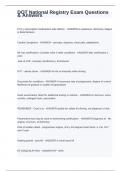DOT National Registry Exam Questions
& Answers
OTC y prescription medications side effects; - ANSWER-ie weakness, dizziness, fatigue
ie Beta blockers
Cardiac Symptoms - ANSWER-- syncope, dyspnea, chest pain, palpitations
MI max certification; Consider what 3 other conditions - ANSWER-Max certification 1
year;
,look at CHF, coronary insufficiency, thrombosis
DVT - advise driver - ANSWER-of risk w/ inactivity while driving
Document for conditions - ANSWER-if necessary rate of progression, degree of control
likelihood of gradual or sudden incapacitation
Heart examination Need for additional testing or referral, - ANSWER-ie murmurs, extra
sounds, enlarged heart, pacemaker
REMEMBER - Goal is to - ANSWER-qualify for safety for driving, not diagnose y treat
Parameters that may be used in determining certification: - ANSWER-Diagnosis of - MI,
angina, murmurs, arrhythmias
Risk of sudden death - progressive angina, 2nd y 3rd degree heart block, a. Fib, SVT
and V tach
Waiting period - post MI - ANSWER-2 month post MI
EF DISQUALIFYING - ANSWER-EF <40%
,Exercise tolerance test parameters - ANSWER-no ischemia
tolerate exercise >6 MET
INR monitoring records how often - ANSWER-monthly
Syncope do y don't certify; max time of certification - ANSWER-DON'T certify w/
symptoms, high risk,
Max 1 year certification
Cleared from specialist
Annual evaluation by specialist
Annual medical examination
Certify - No exact waiting time; not till stable, can refer to pacemaker guidelines
Pacemaker post placement waiting period to certify, parameters and how often to certify
- ANSWER-- Certify 3 months post placement
- documents of correct function
- no symptoms
- ANNUAL RECERTIFICATION
MI DON'T CERTIFY parameters - ANSWER-- recurrent symptoms
- EF <40%
- Abnormal ETT
- ischemic changes
- Poor tolerance meds
MI YES TO CERTIFY - ANSWER-- 2 months post MI
- Cleared by cardiologist
- No angina
- EF >= 40%
, - Medication tolerance
HOW LONG POST MI TO CERTIFY? - ANSWER-2 months
How often to recertification with MI? yearly - ANSWER-
How often for ETT if hx of MI? - ANSWER-biennial; every other year
Identification & History - ANSWER-Identify, query, and note issues in a driver's medical
record and/or health history as available, which may include:
Neurologic disorders (e.g.,loss of consciousness, seizures, stroke/transient ischemic
attack (TIA), headaches/migraines, numbness/weakness).
Neuro - Physical Examination and Evaluation - ANSWER-Examine the driver's
neurologic status and note:
• Impaired equilibrium, coordination, or speech pattern(e.g.,
Romberg, finger-to-nose test).
• Gait disorders, sensory, or positional abnormalities.
Tremor, radicular signs, reflexes(e.g.,asymmetric deep- tendon, normal/abnormal
patellar, and Babinski).
Neuro - Refer a driver who exhibits evidence of any of the following disorders for follow-
up care and evaluation by an appropriate specialist or primary care provider -
ANSWER-Musculoskeletal(e.g.,arthritis, neuromuscular disease). •
Neurologic(e.g.,seizures).
Neurological examination parameters include:
• Function, Range of motion, Strength, Sensation.
• Referral to a neurological specialist for specialized conditions.
Disqualification for any condition that poses unacceptable driving risk.
What are three Neuro "cannot be qualified" conditions? - ANSWER-- 1) Epilepsy, 2)
Meniere's disease, 3) AVM not surgically treated. ( arteriovenous malformation is an




